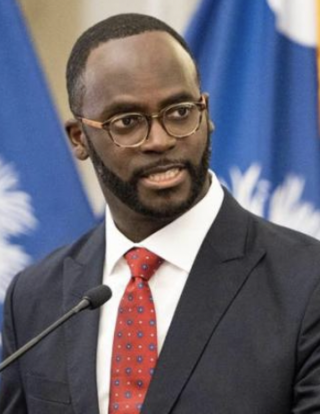
The state controller of California is a constitutional office in the executive branch of the government of the U.S. state of California. Thirty-three individuals have held the office of state controller since statehood. The incumbent is Malia Cohen, a Democrat. The state controller's main office is located at 300 Capitol Mall in Sacramento.

The government of Maryland is conducted according to the Maryland Constitution. The United States is a federation; consequently, the government of Maryland, like the other 49 state governments, has exclusive authority over matters that lie entirely within the state's borders, except as limited by the Constitution of the United States.
The current Constitution of the State of Maryland, which was ratified by the people of the state on September 18, 1867, forms the basic law for the U.S. state of Maryland. It replaced the short-lived Maryland Constitution of 1864 and is the fourth constitution under which the state has been governed. It was last amended in 2024.

The Constitution of the State of Texas is the document that establishes the structure and function of the government of the U.S. state of Texas and enumerates the basic rights of the citizens of Texas.

The state auditor of Minnesota is a constitutional officer in the executive branch of the U.S. state of Minnesota. Nineteen individuals have held the office of state auditor since statehood. The incumbent is Julie Blaha, a DFLer.

The state auditor of Massachusetts is an elected constitutional officer in the executive branch of the U.S. state of Massachusetts. Twenty-six individuals have occupied the office of state auditor since the office's creation in 1849. The incumbent is Diana DiZoglio, a Democrat.

The treasurer and receiver-general of Massachusetts is an elected constitutional officer in the executive branch of the U.S. state of Massachusetts. Originally appointed under authority of the English Crown pursuant to the Charter of the Massachusetts Bay Company, the office of treasurer and receiver-general became an elective one in 1780. Sixty-one individuals have occupied the office of state treasurer over the ensuing centuries. The incumbent is Deb Goldberg, a Democrat who took office January 21, 2015.

The State Treasurer of Oklahoma is the chief custodian of Oklahoma's cash deposits, monies from bond sales, and other securities and collateral and directs the investments of those assets. The treasurer provides for the safe and efficient operation of state government through effective banking, investment, and cash management. The state treasurer has the powers of a typical chief financial officer for a corporation.

The New York state comptroller is an elected constitutional officer of the U.S. state of New York and head of the New York state government's Department of Audit and Control. Sixty-one individuals have held the office of State Comptroller since statehood. The incumbent is Thomas DiNapoli, a Democrat.
In the state and territorial governments of the United States, 54 of the 56 states and territories have the executive position of treasurer. New York abolished the office of New York State Treasurer in 1926, in which the duties were transferred to the New York State Comptroller. Texas abolished the position of Texas State Treasurer in 1996, transferring the duties of that office to the Texas Comptroller of Public Accounts.

State auditors are fiscal officers lodged in the executive or legislative branches of U.S. state governments who serve as external auditors, program evaluators, financial controllers, bookkeepers, or inspectors general of public funds. The office of state auditor may be a creature of the state constitution or one created by statutory law.

The Comptroller of Illinois is a constitutional officer in the executive branch of government of the U.S. state of Illinois. Ten individuals have held the office of Comptroller since the enactment of the Illinois Constitution of 1970, replacing the prior office of Auditor of Public Accounts that was first created in 1799. The incumbent is Susana Mendoza, a Democrat.

The Treasurer of Illinois is a constitutional officer in the executive branch of government of the U.S. state of Illinois. Seventy-four individuals have occupied the office of Treasurer since statehood. The incumbent is Mike Frerichs, a Democrat. A former Champaign County auditor and state senator, Frerichs was first elected to lead the state treasury in 2014 following a close race with Republican candidate Tom Cross.

The Texas Comptroller of Public Accounts is an executive branch position created by the Texas Constitution. The comptroller is popularly elected every four years, and is primarily tasked with collecting all state tax revenue and estimating the amount of revenue that the Texas Legislature can spend each biennium. The current comptroller is Glenn Hegar, who took office on January 2, 2015.
Texas State Treasurer was an elected constitutional officer in the executive branch of the state government of Texas, responsible for overseeing the financial operations of state government. The position was established in the Constitution of 1876. It was officially abolished on August 31, 1996.

The judiciary of Italy is composed of courts and public prosecutor offices responsible for the administration of justice in the Italian Republic. These offices are occupied by judges and prosecutors respectively, who are known as magistrates. Magistrates belong to the magistracy, that is to say a branch of the State that may only be accessed by Italian citizens who hold an Italian Juris Doctor and successfully partake in one of the relevant competitive public examinations organised by the Ministry of justice.

The General Comptroller of the Republic of Chile is a constitutionally autonomous body of the Government of Chile based on chapter 10 of the Constitution of Chile and it is in charge of the control of the legal aspects, management, preaudit and postaudit functions of all the activities of the centralized and decentralized civil service, whatever its forms of organization may be, as well as of other powers granted by law.
The Comptroller and Auditor General (C&AG) is the constitutional officer responsible for public audit in Ireland. The Office of the Comptroller and Auditor General is the public audit body for the Republic of Ireland and is headed by the C&AG.
Comptroller of the Treasury of Maryland v. Wynne, 575 U.S. 542 (2015), is a 2015 U.S. Supreme Court decision that applied the Dormant Commerce Clause doctrine to Maryland's personal income tax scheme and found that the failure to provide a full credit for income taxes paid to other states was unconstitutional.

The comptroller general of South Carolina is a constitutional officer in the executive branch of the U.S. state of South Carolina. Forty individuals have held the office of comptroller general since 1800. The office has been held by Brian J. Gaines since May 12, 2023, who was appointed by Governor Henry McMaster as a recess appointment following the resignation of Richard Eckstrom on April 30, 2023. McMaster appointed Gaines to avoid a constitutional crisis; since the office was vacant, no person could authorize the distribution of funds.































